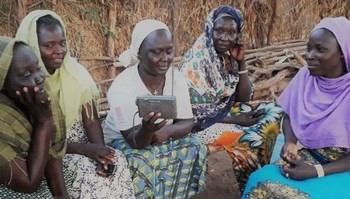Commemorating World Radio Day, today, several South Sudanese citizens said radio remains their most trusted and widely used media, in a country with limited internet access, few newspapers, and limited television coverage.
The citizens told Radio Tamazuj that radio has provided them with information, education and entertainment services, and more so health education in the wake of the ongoing Covid-19 pandemic.
Akire Joseph says, “I listen to the radio every day and I get a lot of information from the radio. Radio is for everyone including children. It unites us in one place. Let us all listen to the radio and share our lives on the radio and listen to different programs so that we bring change in South Sudan.”
For Esther Yugu, the radio is a tool for empowerment and a source of hope and healing.
“I get information that empowers me. It gives me courage for tomorrow. When I listen to the radio I get a lot of advice; even though I am discouraged, I will get encouraged. Even though I am stressed, I will be free of stress. There are a lot of topics there that bring someone out of trauma, out of stress, and out of a lot of things,” she pointed out.
James Rodento says radio is still the most accessed media because many people cannot afford to buy newspapers to get information. He describes radio as a mirror that reflects whatever is happening.
He notes, “Radio is like a mirror. It enlightens and creates awareness for all South Sudanese about the developments of the country. That is one of the reasons I listen to the radio and it has become part of my life.
Whenever you are unhappy and you listen to the radio, you will be happy by listening to some music and programs.”
Listening to the radio from the age of 12, David Martin Sebit says radio has become even more beneficial to him now as he looks for jobs and strives to remain healthy.
“There are some announcements such as job vacancies, health information on Covid-19 and others. There are awareness campaigns that we also share with our family members,” he said.
Martin also disputed a popular belief that radio is for the elderly people saying the radio programs tackle issues that affect everyone in society.
“Radio should not be considered only for old people. It is for everybody. Through the radio, you get a lot of information about the market, when the schools are opening, information on how to treat a particular disease and job vacancies. Radio has music and if you listen to them you will get healed. Some good old songs take us through different memories,” he added.
Another citizen, Victor Bullen Laku agrees that radio is a unifying tool as it allows people from all over the country to share their experiences and challenges.
“I love radio and I got used to it since I was a young boy. The radio is like a bridge between the people and the government or between society and another society. It unites people from different villages, localities, states. It connects different ideas, cultures, and languages,” Bullen said. “Through the news, I will be informed about what is happening in the national or state government.”
Radio for refugees
More than 2 million South Sudanese have sought refuge out of the country, according to the United Nations.
Sadia Mary lives in one of the settlement camps in neighboring Uganda. She, too, says the radio plays a vital role in their lives despite a myriad of challenges.
An avid radio listener since her childhood, Mary says the radio has been a source of hope for her and many refugees who yearn to go back to their original homes.
“My mother is in Yoyo camp, she also listens to the radio every morning. There are some announcements we do get through the radio, including the distribution of our monthly food ratios. I get a lot of information on food, education, and many health benefits,” she said. “There are also messages and information on peaceful coexistence among different communities in the camp. Because there are some misunderstandings sometimes among people here. So they encourage us through radio to peacefully coexist and not to fight one another.”
Mary says she and other refugees are most interested to know the political environment in the country and plans for their repatriation.
“We want to hear more about what is going on in our country. We should also hear more about the government’s plan to repatriate refugees to their homes. We only want to live peacefully and avoid fighting,” she added.
In conclusion, Mary encouraged her fellow refugees to continue listening to the radio and keep hoping for a reunion with their families in the country.
“My prayer is that we might one day go back home and meet once again. Our country is not yet stable but let’s continue to pray that all will go well, she wished.




